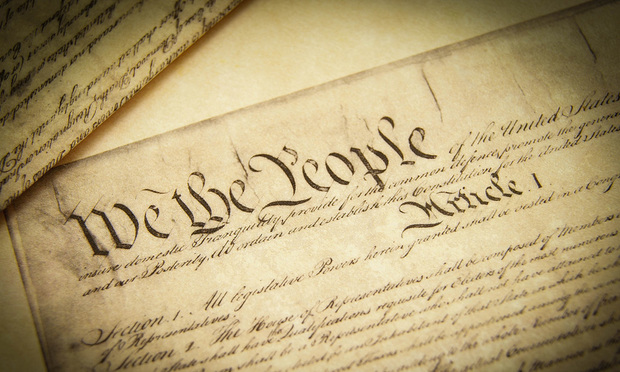Ideological Judging: The Record of Textualism
Textualism, the theory of interpretation espoused by current and former members of the U.S. Supreme Court and many other state and federal judges, focuses intensely on the words and syntax of a law to decide cases.
July 31, 2018 at 01:00 PM
5 minute read

At the Federalist Society convention in November, the White House counsel said, reportedly to everyone's delight, that “the Trump administration's philosophy on judging can be summarized in two words: 'originalism' and 'textualism.'” And no wonder everyone was delighted, because judges who are strict textualists reach politically conservative results—overwhelmingly. The evidence proves it.
Textualism, the theory of interpretation espoused by the late Justice Antonin Scalia, Justice Neil Gorsuch, and many other state and federal judges, focuses intensely on the words and syntax of a law to decide cases. Other considerations—legislative history, the law's broader purpose, judicial intuition, sensible policy, a decision's real-world consequences—matter much less and sometimes not at all.
Supposedly, textualism shows the proper deference to what the legislature says and thus curbs judicial overreaching. Supposedly, textualism is neutral, objective, nonideological—a simple exercise in rule-of-law judging. But as textualism is actually practiced, it fits neither of those descriptions.
That is the conclusion of one study after another. A number of them center on the opinions of Scalia, the pre-eminent advocate of textualism and its cousin, originalism (which seeks to uncover the original public meaning of constitutional language). And the studies all show—if it even needed proving—an unmistakable ideological bent in his opinions.
For instance, professor Geoffrey Stone polled colleagues to identify the 20 most important Supreme Court cases between 2000 and 2013. In every one, Scalia voted for the conservative position. And Stone noted that Scalia's judicial philosophy “in no way” explains that voting record. It was “determined first and foremost by [his] own personal policy preferences.”
To take a state-court example, I reviewed overrulings of settled precedent by the textualist majority on the Michigan Supreme Court between 2000 and 2015. Those justices had all been appointed by a Republican governor or nominated by the Republican Party. In 81 overrulings—itself a remarkable number—the justices reached a conservative result 78 times. That's an ideology rating of 96.3 percent, a number that cannot be rationalized by any jurisprudence that's evenhanded.
Again, the studies only confirm what is pretty obvious to anyone familiar with the decision-making of self-described textualists, especially in significant cases. Textualism has become a brand name for politically driven judging.
You can often recognize the textualist brand by high-sounding pronouncements like these in opinions:
- We begin, as we must, with a careful examination of the statutory language.
- Ascertaining the plain/ordinary meaning of [some word or phrase] is of critical importance to our analysis.
- The proper role of the judiciary is to apply, not amend, the work of the People's representatives.
You can also recognize the brand by laborious parsing in a futile effort to resolve intractable ambiguity; by overreliance on highly malleable and often conflicting so-called canons of construction (last antecedent, series qualifier, ejusdem generis, surplusage, ordinary meaning); and by a propensity to conclude that the “plain language” of a statute compels such and such a result. Judges of all dispositions use and abuse the notion of “plain language,” but textualists more than others exaggerate the number of cases in which the text alone yields a singular or self-evident meaning.
One other sign of the textualist brand is this: a habitual resort to dictionaries for the meanings of contested words. Never mind that most legislative drafters—the professionals who write laws—rarely consult dictionaries in their work. Plucking from among dictionary definitions to decide cases is misguided as a matter of language theory: It equates a word's meaning in a particular instance with the conditions, or properties, in an isolated definition, rather than looking to the contextual patterns that the word commonly appears in. One dictionary editor has said that judges' reliance on dictionaries is “probably wrong, in almost all situations” (Jesse Sheidlower, former editor at large of the Oxford English Dictionary).
What's more, judges' actual performance in using dictionaries has been dismal. To again take just one of the many studies, professors James J. Brudney and Lawrence Baum found that the Supreme Court's use of dictionaries is “strikingly ad hoc and subjective”; that justices tend to “cherry-pick definitions that support results reached on other grounds”; and that “the image of dictionary usage as authoritative … is little more than a mirage.”
The legal world would be better off if judges did not tilt one way or another, liberal or conservative. But they do now and always have: Judges are influenced by their backgrounds and worldviews. Textualists, though, seem particularly unwilling to acknowledge that truth, or concede that their interpretive theory is just as pliable as others, or own up to the one-sided record it has produced in cases that shape the law. Theirs is a convenient and persistent blindness.
Correction: An earlier version of this column misidentified the professors associated with the study of the Supreme Court's use of dictionaries. The professors are James J. Brudney and Lawrence Baum.
Joseph Kimble is a distinguished professor emeritus at WMU-Cooley Law School and the author of three books on legal writing. He is senior editor of The Scribes Journal of Legal Writing and the longtime editor of the “Plain Language” column in the Michigan Bar Journal. He also writes an editing column called “Redlines” for Judicature.
This content has been archived. It is available through our partners, LexisNexis® and Bloomberg Law.
To view this content, please continue to their sites.
Not a Lexis Subscriber?
Subscribe Now
Not a Bloomberg Law Subscriber?
Subscribe Now
NOT FOR REPRINT
© 2025 ALM Global, LLC, All Rights Reserved. Request academic re-use from www.copyright.com. All other uses, submit a request to [email protected]. For more information visit Asset & Logo Licensing.
You Might Like
View All


Restoring Antitrust: Returning to the Consumer Welfare Standard
Trending Stories
Who Got The Work
J. Brugh Lower of Gibbons has entered an appearance for industrial equipment supplier Devco Corporation in a pending trademark infringement lawsuit. The suit, accusing the defendant of selling knock-off Graco products, was filed Dec. 18 in New Jersey District Court by Rivkin Radler on behalf of Graco Inc. and Graco Minnesota. The case, assigned to U.S. District Judge Zahid N. Quraishi, is 3:24-cv-11294, Graco Inc. et al v. Devco Corporation.
Who Got The Work
Rebecca Maller-Stein and Kent A. Yalowitz of Arnold & Porter Kaye Scholer have entered their appearances for Hanaco Venture Capital and its executives, Lior Prosor and David Frankel, in a pending securities lawsuit. The action, filed on Dec. 24 in New York Southern District Court by Zell, Aron & Co. on behalf of Goldeneye Advisors, accuses the defendants of negligently and fraudulently managing the plaintiff's $1 million investment. The case, assigned to U.S. District Judge Vernon S. Broderick, is 1:24-cv-09918, Goldeneye Advisors, LLC v. Hanaco Venture Capital, Ltd. et al.
Who Got The Work
Attorneys from A&O Shearman has stepped in as defense counsel for Toronto-Dominion Bank and other defendants in a pending securities class action. The suit, filed Dec. 11 in New York Southern District Court by Bleichmar Fonti & Auld, accuses the defendants of concealing the bank's 'pervasive' deficiencies in regards to its compliance with the Bank Secrecy Act and the quality of its anti-money laundering controls. The case, assigned to U.S. District Judge Arun Subramanian, is 1:24-cv-09445, Gonzalez v. The Toronto-Dominion Bank et al.
Who Got The Work
Crown Castle International, a Pennsylvania company providing shared communications infrastructure, has turned to Luke D. Wolf of Gordon Rees Scully Mansukhani to fend off a pending breach-of-contract lawsuit. The court action, filed Nov. 25 in Michigan Eastern District Court by Hooper Hathaway PC on behalf of The Town Residences LLC, accuses Crown Castle of failing to transfer approximately $30,000 in utility payments from T-Mobile in breach of a roof-top lease and assignment agreement. The case, assigned to U.S. District Judge Susan K. Declercq, is 2:24-cv-13131, The Town Residences LLC v. T-Mobile US, Inc. et al.
Who Got The Work
Wilfred P. Coronato and Daniel M. Schwartz of McCarter & English have stepped in as defense counsel to Electrolux Home Products Inc. in a pending product liability lawsuit. The court action, filed Nov. 26 in New York Eastern District Court by Poulos Lopiccolo PC and Nagel Rice LLP on behalf of David Stern, alleges that the defendant's refrigerators’ drawers and shelving repeatedly break and fall apart within months after purchase. The case, assigned to U.S. District Judge Joan M. Azrack, is 2:24-cv-08204, Stern v. Electrolux Home Products, Inc.
Featured Firms
Law Offices of Gary Martin Hays & Associates, P.C.
(470) 294-1674
Law Offices of Mark E. Salomone
(857) 444-6468
Smith & Hassler
(713) 739-1250









